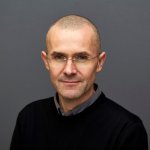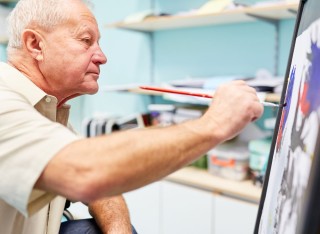The Creative Dementia Network: Digital Tools for Wellbeing with Dementia (DoWell)
Start date
September 2023End date
July 2024Overview
The human and economic costs of dementia are staggering. There are 55 million people currently living with dementia, but this is expected to rise to 140 million by 2050. Dementia care costs $1.3 trillion a year, but this will rise to $2.8 trillion by 2050.
Drug treatments for dementia remain limited, but there’s growing evidence that non-drug therapies can make life with dementia better, if not longer. Studies using creative expression (CE) programmes based on arts, drama, storytelling and others have proved particularly effective in ameliorating certain neuropsychiatric symptoms, positively impacting quality of life, and amplifying the voices of people with dementia to thereby counter stigmas surrounding the disease.
Dr Stephen Fay has extended this evidence in important new directions. From February 2020, he led the Proyecto Narrativas study using the TimeSlips storytelling method with more than 70 participants in Medellín, Colombia. The outbreak of the COVID-19 pandemic led to an urgent transition to digital delivery, which was both a challenge and an opportunity. Over the next 18 months, Proyecto Narrativas became the longest, largest and first online evaluation of this method, and a communication and creativity lifeline for participants.
The Digital Tools for Wellbeing with Dementia (DoWell) project, funded through the University of Surrey’s Arts & Humanities IAA, will bring the benefits of Stephen’s work to the UK and deliver positive impacts to people living with dementia (all members of the 3 Nations Dementia Working Group). Working with the participants, industry partners and inclusive design specialists, DoWell will co-create an accessible toolkit for the design and delivery of future digital health and wellbeing programmes for people with dementia.
Related sustainable development goals

Team

Principal Investigator
Dr Stephen Fay
Senior Lecturer in Spanish & Director of the Digital World Research Centre
Biography
I am a Medical Humanities scholar who combines expertise in Hispanic literatures with innovative research into digital creative therapies for people with dementia in Latin America and the UK.
In 2019 (with support from the Global Challenges Research Fund) I established the UK’s first research collaboration with the world-leading Antioquia Neuroscience Group (GNA) in Colombia. I brought together a multi-centre (GNA, Aston University, University of Wisconsin-Milwaukee, Columbia University) and interdisciplinary team (neurologists, psychologists, speech therapists, humanities scholars) to design and deliver research into the use of creative narratives to support the mental health and wellbeing of people with dementia and their families.
COVID-19 obliged us to adapt our in-person methodologies to virtual delivery, turning our original 10-week pilot study into an 8-month creativity and community lifeline for our participants and their families. On the basis of this success, we are now running a full feasibility and effectiveness study of the online provision of psychosocial interventions for people with dementia in Latin America, with future extension into the UK.
I joined the University of Surrey in February 2022. I previously taught Spanish and Latin American Studies at UCL, KCL, the University of Nottingham and Aston University.
I warmly welcome enquiries from potential PhD candidates in areas of specialism such as Hispanic Studies, Caribbean Literary and Cultural Studies, Medical Humanities and Dementia Studies.

Professor David Frohlich
Emeritus Professor of Interaction Design
Biography
David Frohlich is now Emeritus Professor of Interaction Design in the School of Psychology from July 2024. He continues to support the work of Digital World Research Centre (DWRC) in the Faculty of Arts, Business and Social Sciences and the Health Psychology group in the Department of Psychological Interventions. He will also teach an Interaction Design module on the new MSc on Psychology of game design and digital innovation in the spring of 2025.
David was Director of DWRC for nearly 20 years from January 2005 to June 2024, where he ran 40 funded projects and 17 PhD projects on new media innovation with social benefit. The current work of the Centre includes a mixture of PhD and Research Council projects exploring digital storytelling, personal media collections and augmented paper (http://www.surrey.ac.uk/dwrc/). Prior to joining Digital World, David worked for 14 years as a senior research scientist at HP Labs, conducting design research on the future of mobile, domestic and photographic technology.
He has contributed numerous studies and patents to the field of digital photography, as indicated in two recent books entitled 'From snapshots to social media: The changing picture of domestic photography' (2011 with Sarvas) and 'Fast design, slow innovation: Audiophotography ten years on' (2016). His recent and ongoing work is focussed on assistive media for health and wellbeing, especially for an older population.
David has a PhD in psychology from the University of Sheffield and post-doctoral training in Conversation Analysis from the University of York. He has held visiting positions at the Royal College of Art, and the Universities of York, Manchester, Sydney (UTS), Melbourne, Federal University of São Carlos (UFSCAR) and Swansea University, and is founding editor of the international journal Personal and Ubiquitous Computing.

Anne-Marie Greenaway
Research Associate
Planned Impact
There is an urgent need to extend the positive impacts of digital health and wellbeing programmes to people living with dementia in the UK. There is also a need to capitalise on the vital experiences of the COVID-19 pandemic to create toolkits that will enable designers, practitioners and policy makers to support scaled-up access to these digital therapies for large populations at relatively low cost.
This project will extend the positive impacts of the Proyecto Narrativas digital CE study and facilitate access to Goldster’s comprehensive digital activities suite to people living with dementia in the UK. The project will go further and ensure its impacts are targeted, sustainable and replicable through the cocreation with key stakeholders of a toolkit for the design and delivery of future dementia-focused eHealth and eWellbeing solutions.
Phase 1 Outcomes
In this first phase of the DoWell study, we used the Timeslips method to create group stories inspired by visual stimuli. This gradual immersion into creative storytelling was welcomed by the participants.
"It wasn't like jumping into a swimming pool where you don't know what the temperature is like and realising it's cold and perhaps you don't really want to be there. This was a gradual getting in and feeling, 'Ah it's warm, this is nice, I feel safe, I feel comfortable, perhaps i'll have a go. I might even get to a point where i'm out of my depth and still feel OK." - Study Participant
Phase 2 Outcomes
The sessions in this phase were led by David Mark, an award-winning novelist and creative writing coach with Goldster. Inspired by the participants' insistence that memory wasn't a dirty word for people living with dementia, David first prompted them to write stories based on their own reminiscences.
Later in this phase we started to make creative magic by combining memory and make believe, often following David's prompt to tell our remembered stories from someone (or something) else's perspective. This also extended to the participants' imaginative reflections on their dementia diagnoses, which became some of the project's most powerful stories.




